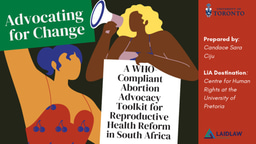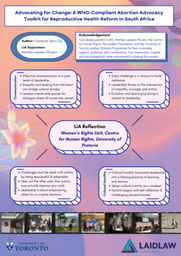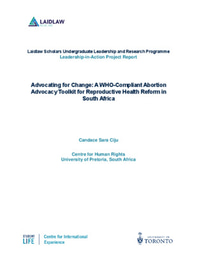LiA Week 2 Log - Laying the Groundwork
What went well?
This week, I had the opportunity to meet the rest of the Women’s Rights Unit team at the Centre, which helped me feel more connected to the broader work being done in this space. Although my supervisor is still away on a work trip, I received confirmation that the team would like me to move forward with developing the advocacy toolkit. This clarity gave me a renewed sense of direction, and I have since been actively engaging in the research and planning process.
Over the past few days, I’ve focused on understanding what makes an advocacy toolkit both practical and impactful. I began by studying a variety of well-regarded international and South African toolkits, first looking at general structures and approaches, and then narrowing my focus to those that specifically address abortion rights advocacy. Through this process, I’ve gained a strong understanding of the essential components of an effective toolkit, including framing key messages, identifying target audiences, selecting advocacy strategies, and incorporating accessible and inclusive language.
What could have been done differently?
To be honest, I feel that this week went quite smoothly, and I’m satisfied with how I approached my tasks. I stayed proactive and made steady progress on the advocacy toolkit. While I’m always open to improving how I work, I don’t believe there was anything specific I could have done differently this week. I made thoughtful decisions, stayed organized, and took initiative in a way that helped move the project forward.
What did I learn about myself when working with others?
I learned that I work best when there are clear deadlines and structured expectations. In group settings, I noticed that when tasks were open-ended or lacked specific timelines, I found it harder to stay engaged or prioritize my contributions effectively. But when there was a set schedule or a shared understanding of when things needed to be done, I became more focused, organized, and proactive. It also made me realize how important communication and planning are for me to contribute effectively and keep myself on track.
What did I learn about leadership?
Through my conversations with colleagues working on the implementation of the Maputo Protocol, I learned that true leadership, especially in the field of human rights and gender justice, is rooted in resilience. The Maputo Protocol is a legally binding treaty adopted by the African Union that guarantees comprehensive rights for women and girls in Africa, including rights to political participation, social and political equality, and control over reproductive health. My colleagues shared how disheartening it can be to work with some government officials of Maputo Protocol ratified African countries who hold deeply anti-feminist views, with some even questioning women’s right to own property.
Despite the emotional toll and frustration of such conversations, the Women’s Rights Unit continue their work with tireless dedication. They support civil society organizations and government departments in submitting Maputo Protocol implementation reports to the African Union and remain committed to the cause, even when progress feels slow or even regressive. This experience taught me that leadership is not about quick wins or recognition. It is about standing firm in your values, showing up with hope and purpose, and continuing the work even when the odds are discouraging. Resilient leadership means choosing persistence over despair and believing in change even when it is difficult to see.
What do I want to develop or focus on next?
Next, I want to develop and focus on creating an initial framework for an advocacy toolkit aimed at pharmacists, medical practitioners, nurses, doctors, and hospitals. This toolkit will provide essential information on the administration of self-managed abortions, address issues related to belief-based denial of care based on the Centre’s research work.
A key part of this task is to identify and compile a list of potential organizations that the Centre for Human Rights can engage with to distribute the toolkit effectively. The goal is to help close the gap between abortion legislation and its practical implementation by medical practitioners in South Africa.



Please sign in
If you are a registered user on Laidlaw Scholars Network, please sign in